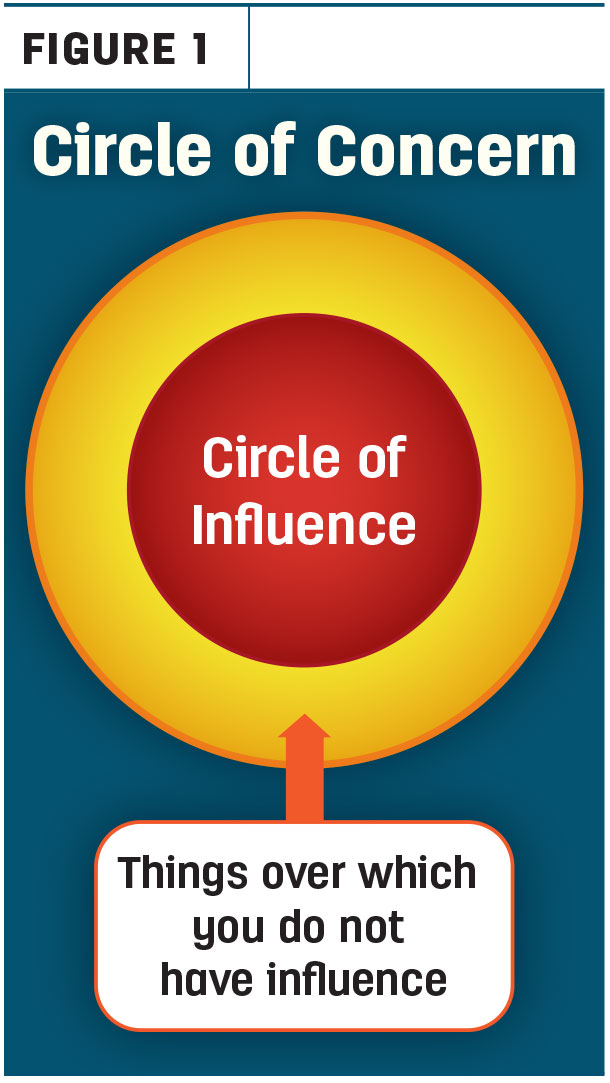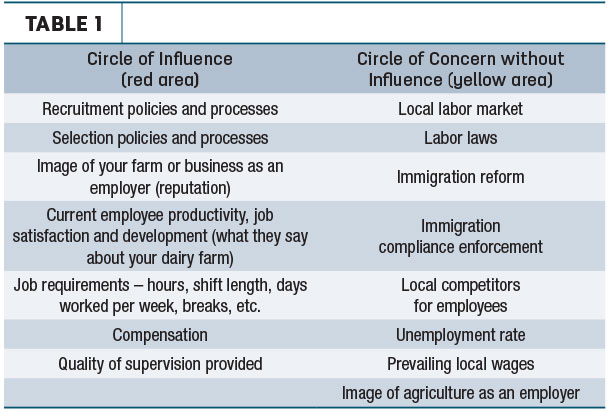Recruitment and selection are not the fondest areas of work for most dairy farm managers, leaders and owners. It, therefore, is important to productively focus your energies. To better understand the importance of focus, we start with a discussion of the circles of concern and influence.
Focus on what you can influence
Look at Figure 1. The complete circle, labeled “circle of concern” (including both the yellow and red areas) comprises everything that concerns you as a leader and manager.

The middle red circle, labeled “the circle of influence,” includes a subset of the circle of concern. This subset includes everything you can impact – the things you have at least some influence or control over.
The outer yellow ring includes everything that is of concern but cannot be influenced or impacted. Examples include weather, economic conditions, agricultural trends and the local labor market. You must recognize you cannot change anything in this outer ring, at least in the short run, and thus need to focus elsewhere.
I am certain you are saying, “That’s easy to say but hard to do.” I agree. It is, however, an important key to you and your workforce to focus on what creates success for your dairy.
The inner red circle contains everything that both concerns you and that you can influence. It is where you need to focus. For a farm, the circle of influence includes everything you influence and control day-to-day and everything you influence and control in your dairy farm business strategy.
How these circles apply to hiring
In recent weeks and months, I have heard much discussion and hand-wringing about hiring employees. Most of this discussion has focused on immigration issues, local labor markets and the image of agriculture.
These are all important issues for industry groups and industry leaders. For hiring your next employee, however, there is nothing you can do to change them. They are in that outer yellow ring – things that concern you but you cannot influence. Placing your focus here is unproductive and only causes frustration. In Table 1, these items are in the right-hand column.

Your hiring focus should be on the items in the left-hand column – your circle of influence. They will determine your success in hiring and retaining great employees.
Let’s take a little detour. Some of you may have had a challenging crop-growing year. All of you have had those years at some point. Those years are frustrating. It, however, makes you feel a little better when your crops are the best in the neighborhood.
I expect you are thinking: “Bob, how can that possibly apply to hiring?” Look at it this way. Unfortunately, agriculture does not have a good reputation as an employer, i.e., poor crops. Similar to you wanting to have the best crops, you can become the best employer. We refer to that as a preferred employer – the place where good, qualified candidates want to work.
A farm or other business becomes a preferred employer in two ways. First, the ranch, farm or business must be a great place to work – a clearly articulated and meaningful vision, a positive business culture, excellent supervision with clear expectations and large quantities of great feedback, opportunities for increased responsibilities and personal growth, and competitive compensation.
Second, the farm or other business must communicate that excellence to potential employees through networking in the community and with potential labor pools and through professional recruitment and selection processes. Every item in the left-hand column in Table 1 is a part of becoming a preferred employer.
Obviously, you cannot become a preferred employer overnight. You can, however, take steps to become a better employer starting today. I suggest three starting points:
1. Improve recruitment and selection. You do not need a human resources department to write professional recruitment materials and develop an effective, consistent interview process. It will, however, require priority setting and take time.
2. Become a more effective supervisor. Supervising people is a challenge for most of us because leading people is very different from managing cows and crops. I certainly encourage you to study and learn supervisory skills. You can, however, become a better supervisor today by listening more, by becoming clearer in your explanations, by providing high-quality feedback and by making supervision a higher priority.
3. Promote your farm. Two key points: Recruitment is marketing, and a large and increasing proportion of hires are reached through networking. Certainly, it is important to include positive attributes in your recruitment materials. It can also be beneficial to “network” with potential candidates. Perhaps you can hire an intern or assist your local FFA or participate in a job fair.
We all have a limited amount of time and energy. Time and energy spent in the circle of concern and not in the circle of influence means less time to focus on the important items, including becoming a preferred employer. ![]()
Bob Milligan is also professor emeritus, Dyson School of Applied Economics and Management, Cornell University. Email Bob Milligan.






